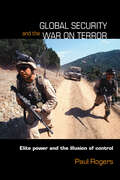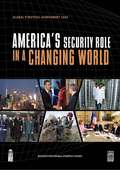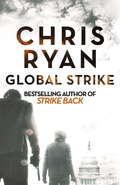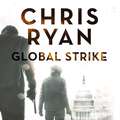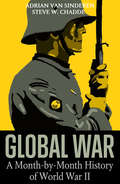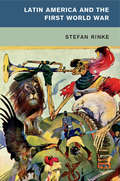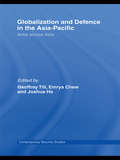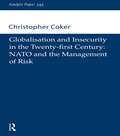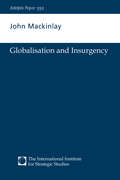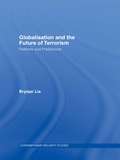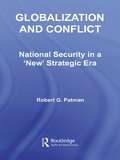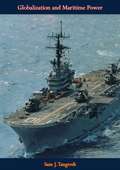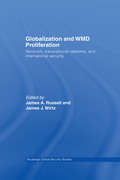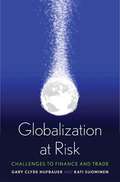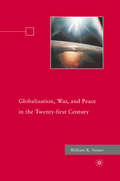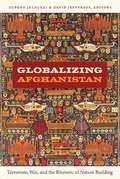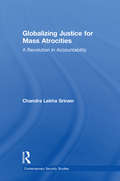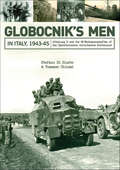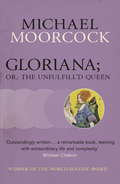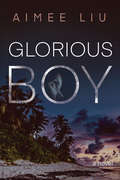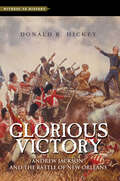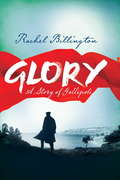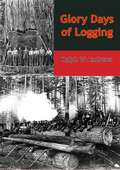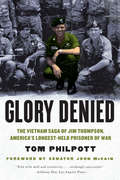- Table View
- List View
Global Security and the War on Terror: Elite Power and the Illusion of Control (Contemporary Security Studies)
by Paul RogersAs the ‘War on Terror’ evolves into the ‘Long War’ against Islamo-fascism, it demands an enduring commitment to ensuring the security of the United States and its allies. This policy is based on the requirement to maintain control in a fractured and unpredictable global environment, while paying little attention to the underlying issues that lead to insecurity. It is an approach that is manifestly failing, as the continuing problems in Afghanistan and Iraq demonstrate. Moreover, ‘control’ implies the maintenance of a global order that focuses on power remaining in the hands of a transnational elite community, principally focused on North America and Western Europe, but extending worldwide. This elite largely ignores socio-economic divisions and environmental constraints, and sees continuing stability as being best achieved by the maintenance of the status quo, using force when necessary. This collection of essays by Professor Paul Rogers argues that this post-Cold War security paradigm is fundamentally misguided and unsustainable. It concludes with two new essays on the need for a new conception of global security rooted in justice and emancipation. Global Security and the War on Terror will be essential reading for students and scholars of security studies, the Cold War, international relations and development studies.
Global Strategic Assessment 2009: America's Security Role in a Changing World
by Patrick M. Cronin Institute for National Strategic Studies (U.S.), (Institute for National Strategic Studies National Defense University (U.S.) (National Defense UniversityOffers a conceptual pathway for U.S. policymakers to begin recalibrating America's security role to reverse what has appeared to be a widening gap between U.S. ends and means, now and in the future. Provides an overview of eight broad trends shaping the international security environment; a global analysis of the world's seven regions, to consider important developments in their distinctive neighborhoods; and, an examination of prospective U.S. contributions, military capabilities and force structure, national security organization, alliances and partnerships, and strategies.
Global Strike: A Strike Back Novel (3)
by Chris RyanIf you love the Strikeback series, pre-order the thrilling new book, Red Strike, now. Coming February 2019.Charles Street was once a highly-respected agent working for MI6, until a terrible mistake cost him his job. Now he's a desperate man, living on past glories and struggling to make ends meet. Until he makes a discovery that has the power to bring down the new President of the United States.But when Street tries to cash in on this discovery, he finds himself pursued by a Russian snatch squad.Strike Back hero John Porter and Regiment renegade John Bald are recruited by their handler to head to Washington, D.C. Their mission: find Street before the Russians.What begins as a routine exfiltration quickly descends into a brutal struggle and the ex-SAS legends will need to use all of their fighting instincts to stay alive.It seems someone is desperate to stop Street from going public with the dossier. Bald and Porter face a race against time to protect him.A startling revelation that leads from the White House to the Kremlin threatens to trigger a new global conflict...
Global Strike: A Strike Back Novel (3) (Strikeback #3)
by Chris RyanIf you love the Strikeback series, pre-order the thrilling new book, Red Strike, now. Coming February 2019.Charles Street was once a highly-respected agent working for MI6, until a terrible mistake cost him his job. Now he's a desperate man, living on past glories and struggling to make ends meet. Until he makes a discovery that has the power to bring down the new President of the United States.But when Street tries to cash in on this discovery, he finds himself pursued by a Russian snatch squad.Strike Back hero John Porter and Regiment renegade John Bald are recruited by their handler to head to Washington, D.C. Their mission: find Street before the Russians.What begins as a routine exfiltration quickly descends into a brutal struggle and the ex-SAS legends will need to use all of their fighting instincts to stay alive.It seems someone is desperate to stop Street from going public with the dossier. Bald and Porter face a race against time to protect him.A startling revelation that leads from the White House to the Kremlin threatens to trigger a new global conflict...
Global Strike: A Strike Back Novel (3) (Strikeback #7)
by Chris RyanThe third book in the Strikeback series.Charles Street was once a highly-respected agent working for MI6, until a terrible mistake cost him his job. Now he's a desperate man, living on past glories and struggling to make ends meet. Until he makes a discovery that has the power to bring down the new President of the United States.But when Street tries to cash in on this discovery, he finds himself pursued by a Russian snatch squad.Strike Back hero John Porter and Regiment renegade John Bald are recruited by their handler to head to Washington, D.C. Their mission: find Street before the Russians.What begins as a routine exfiltration quickly descends into a brutal struggle and the ex-SAS legends will need to use all of their fighting instincts to stay alive.It seems someone is desperate to stop Street from going public with the dossier. Bald and Porter face a race against time to protect him.A startling revelation that leads from the White House to the Kremlin threatens to trigger a new global conflict...(P)2018 Hodder & Stoughton Limited
Global War: A Month-by-Month History of World War II
by Adrian Van SinderenGlobal War, first published in 1946 and updated in 2014, is an eminently readable, month-by-month account of the major political and military events of the six years of the Second World War (1939-1945). Included are synopses of the battles on land, sea, and air (from all theaters of the War), and excerpts from important speeches by world leaders such as Roosevelt, Churchill, Stalin, Hitler, Mussolini, and the Emperor of Japan. A convenient month-by month format places each item in a chronological sequence so readers will better understand the unfolding and course of this global conflict, and from the perspective of each combatant, whether Allied, Axis, or neutral.
Global and International History: Latin America and the First World War
by Reid Rinke Stefan Reid Christopher W. Stefan RinkeUsing a broad variety of textual and visual sources, Latin America and the First World War goes beyond traditional diplomatic history and analyzes the global dimension of the history of the Great War. Filling a significant gap in transnational histories of the war, Stefan Rinke addresses political, social, and economic aspects as well as the cultural impact of the war on Latin America and vice versa. Rinke's meticulous research is based on sources from the nineteen independent states of the entire subcontinent and promises to be the most comprehensive examination to date of Latin America before, during, and immediately after the war.
Globalisation and Defence in the Asia-Pacific: Arms Across Asia (Contemporary Security Studies)
by Geoffrey Till Emrys Chew Joshua HoThis edited volume examines the impact of globalisation on the economies, security policies and military-industrial complexes of the Asia-Pacific region. The work is structured into three main parts. The first explores globalization and its general effects on the policy-making of the nation-state; the second section looks at how globalisation affects a country’s threat perception and defence posture within the specific context of the Asia-Pacific region; while the third explores how it impacts on a state’s allocation of resources to defence, and how economic globalization affects the defence industry, with specific reference to the procurement policies and practices of different states across the Asia-Pacific.
Globalisation and Insecurity in the Twenty-First Century: NATO and the Management of Risk (Adelphi series #345)
by Christopher CokerDiscusses the impact of globalisation on security in the West and in particular the way it has changed the nature of NATO as well as its security agenda.
Globalisation and Insurgency (Adelphi series)
by John MackinlayThe central proposition of this book is that global changes have altered the nature of insurgency by weakening some governments and empowering the forces that seek to overthrow them. The book identifies four distinct categories of insurgent force, and concludes that globalisation of insurgency leads inexorably to the globalisation of counter-insurgency.
Globalisation and the Future of Terrorism: Patterns and Predictions (Contemporary Security Studies)
by Brynjar LiaThis new study is devoted to understanding how international terrorism is shaped, how it evolves and what we can expect in the future. Drawing upon research and methods outside the traditional focus, and by taking both a theoretical approach and a new practical predictive perspective, it delivers a fresh and fascinating contribution to terrorism studies. While predicting terrorism is a highly speculative business, there are ways of identifying certain long-term causes, driving forces and their links with society. Terrorists are usually integral players in local and sometimes global politics. Hence, when the local, regional and international contexts change, so does terrorism. Thoroughly reviewing the body of literature on the causes of terrorism, this study also combines predictive and futuristic analyses on globalisation, supported by a range of key case studies. It spans from the transformation of international relations, the globalisation of the market economy, demographic factors, ideological shifts and technological changes. The result is a set of key conclusions about the future patterns of terrorism, which are not simply best guesses, but also backed up by solid research. This book will be of great interest to all students and scholars of terrorism, globalisation, politics and international relations.
Globalization and Conflict: National Security in a 'New' Strategic Era (Contemporary Security Studies)
by Robert G. PatmanThis volume highlights the gap between the new security environment and the notion of state-centred national security favoured by Washington, showing how a Cold War phenomenon known as the national security state, in which defence and foreign policy interests essentially converge, remains largely intact. The conventional wisdom since the suicide attacks of 9/11 is that the world has been transformed and, according to President Bush, "September 11 changed the strategic thinking" of the US. This book challenges these assumptions. Indeed, the Bush administration’s National Security strategy of 2002 has reinvigorated and even extended the idea of national security. Paradoxically, the renewed emphasis on a distinctly state-centred approach to security, including the War on Terror, has unfolded during an era of deepening globalization. Drawing on the international expertise of fourteen specialists, the book examines four inter-related themes: the impact of globalization on the concept of security the strategic outlook of the world’s only superpower, the US the new conflicts that have come to characterize the post-Cold War era efforts to regulate the emerging patterns of conflict in the world. Globalization and Conflict will be essential reading for students of strategic studies, security studies and international relations.
Globalization and Maritime Power
by Sam J. TangrediGlobalization and Maritime Power focuses on the direct impact of globalization on naval forces and the maritime aspects of commerce and international relations. It seeks to translate what we have learned about the phenomenon of globalization into the language of strategy and defense policy. This book uses a general knowledge of globalization to deduce its impact on the maritime world, and applies inductive reasoning to the maritime impacts of defense planning. Its intent is to provide national security leaders with analyses applicable to the future security environment.—Print ed.
Globalization and WMD Proliferation: Terrorism, Transnational Networks and International Security (Routledge Global Security Studies #Vol. 4)
by James J. Wirtz James A. RussellThis edited volume explores the relationship between the accelerating process of globalization and the proliferation of Weapons of Mass Destruction, which is increasingly seen as the pre-eminent threat to international security. The proliferation of Weapons of Mass Destruction has traditionally been seen as a function of the 'security dilemma' in the state-based international system. But the advent of the nuclear supply network pieced together by the Pakistani scientist A. Q. Khan represented a departure from this model, involving a variety of organizations not directly connected to a state. This volume assembles an international group of experts in order to assess the relationship between proliferation and globalization to ascertain how contemporary communication, transportation and financial networks are facilitating or constraining trade in dangerous contraband. The book ultimately seeks to determine whether globalization is fundamentally altering the nature of the proliferation problem, particularly the threat that Weapons of Mass Destruction might fall into the hands of terrorists. This book will be of much interest to students of nuclear proliferation, international security, terrorism and IR in general.
Globalization at Risk
by Gary Clyde Hufbauer Kati SuominenHistory has declared globalization the winner of the 20th century. Globalization connected the world and created wealth unimaginable in the wake of the Second World War. But the financial crisis of 2008-09 has now placed at risk the liberal economic policies behind globalization. Engulfing the entire world, the crisis gave new fuel to the skeptics of the benefits of economic integration. Policy responses seem to favor anti-globalizers. New regulations could balkanize the global financial system, while widespread protectionist impulses might undo the Doha Round. Issues from climate change to national security may be used as convenient excuses to keep imports out, keep jobs at home, and to clamp down on global capital. Will globalization triumph or perish in the 21st century? What reforms make sense in the post-crisis world? International economists Gary Clyde Hufbauer and Kati Suominen argue that globalization has been a force of great good, one that needs to be actively advanced and honed. Drawing on the latest economic analyses, they reveal the drivers and effects of global finance and trade, lay out the key risks to globalization, and offer a practical policy roadmap for managing the challenges while increasing the gains. Vital reading for anyone in business, finance, foreign affairs, or economics,Globalization at Riskis sure to advance public debate on this defining issue of the 21st century.
Globalization, War, and Peace in the Twenty-First Century
by William R. NesterThis book explores humanity's most persistent and tragic problem by answering some crucial questions including: How is military power created and asserted? What are weapons of mass destruction and what is the likelihood of them being used? What are the source, methods, and results of terrorism and counterterrorism?
Globalizing Afghanistan: Terrorism, War, and the Rhetoric of Nation Building
by Zubeda Jalalzai David JefferessGlobalizing Afghanistan offers a kaleidoscopic view of Afghanistan and the global networks of power, influence, and representation in which it is immersed. The military and nation-building interventions initiated by the United States in reaction to the events of September 11, 2001, are the background and motivation for this collection, but they are not the immediate subject of the essays. Seeking to understand the events of the past decade in a broad frame, the contributors draw on cultural and postcolonial approaches to provide new insights into this ongoing conflict. They focus on matters such as the implications of Afghanistan's lucrative opium trade, the links between the contemporary Taliban movement and major events in the Islamic world and Central Asia since the early twentieth century, and interactions between transnational feminist organizations and the Afghan women's movement. Several contributors address questions of representation. One looks at portrayals of Afghan women by the U. S. government and Western media and feminists. Another explores the surprisingly prominent role of Iranian filmmaking in the production of a global cinematic discourse about Afghanistan. A Pakistani journalist describes how coverage of Afghanistan by reporters working from Pakistan's Khyber-Pakhtoonkhwa (formerly the North West Frontier Province) has changed over the past decade. This rich panoply of perspectives on Afghanistan concludes with a reflection on how academics might produce meaningful alternative viewpoints on the exercise of American power abroad. Contributors. Gwen Bergner, Maliha Chishti, Cheshmak Farhoumand-Sims, Nigel C. Gibson, Zubeda Jalalzai, David Jefferess, Altaf Ullah Khan, Kamran Rastegar, Rodney J. Steward, Imre Szeman
Globalizing Justice for Mass Atrocities: A Revolution in Accountability (Contemporary Security Studies)
by Chandra Lekha SriramThis major new study examines the developing practice of universal jurisdiction, as well as the broader phenomenon of "globalizing" justice, and its ramifications. With a detailed overview of the contemporary practice of universal jurisdiction, it discerns three trends at work: pure universal jurisdiction, universal jurisdiction "plus", and non-use. It also argues that these disparities in practice should raise serious concerns as to the legitimacy and perceived legitimacy of such globalized justice. It then turns to a further consideration, that of globalized justice, precisely because it takes place far from the locus of the crime, and is therefore "externalized" and may fail to achieve many of its putative goals. In addition, this is a key assessment of civil accountability, through the use of the Alien Tort Claims Act in the United States. It details how the use of civil penalties may offer new avenues for redress, particularly with relation to group accountability, whether that of armed groups or of corporations. However, it balances this approach to accountability with recognition of certain flaws within externalized criminal accountability. This study also focuses on mixed tribunals, or other methods of internationalized justice as viable alternatives, which may avoid some of the problems with external justice, but are themselves far from perfect. Mixed or hybrid tribunals in East Timor and Sierra Leone represent different models of hybrid justice and provide the reader with excellent examples of these new forms of justice in action. This book will be of great interest to all students and scholars of human rights international law and political science.
Globocnik's Men in Italy, 1943–45: Abteilung R and the SS-Wachmannschaften of the Operationszone Adriatisches Küstenland
by Stefano Di Giusto Tommaso ChiussiThe history and activities of the notorious Nazi unit Abteilung R in Italy
Gloriana; or, The Unfulfill'd Queen: Or, The Unfulfill'd Queen
by Michael MoorcockGloriana rules an Albion whose empire embraces America and most of Asia. A new Golden Age of peace, enlightenment and prosperity has dawned. Gloriana is Albion and Albion is Gloriana; if one falls, so too will the other. And Gloriana is oppressed by the burden this places upon her - and by the fact that she remains incapable of orgasm. The maintenance of the delicate balance that keeps Albion and Gloriana thriving depends on Montfallcon, Gloriana's Chancellor, and on his network of spies and assassins - in particular on Quire, cold hearted seducer of virtue and murderer of innocence. When Quire falls out with Montfallcon, he forms an alliance with his greatest enemy and conceives a plan to ruin Gloriana, destroy Albion, the empire and the Golden Age itself. But even the utterly ruthless Quire does not fully understand what he has set in motion when he persuades the Queen to fall in love with him... Moorcock's masterly evocation of Gloriana's strange and secretive palace and of a vibrant London make this one of his most powerful and memorable novels.
Glorious Boy: A Novel
by Aimee E. Liu“An absolutely gorgeous historical novel . . . set against the backdrop of a tribe in the Andamans struggling with British rule . . . Just magnificent.” —Caroline Leavitt, New York Times bestselling author of Pictures of YouOne of Booklist’s Top Ten Historical Fiction Books of 2020Glorious Boy is a tale of war and devotion, longing and loss, and the power of love to prevail. Set in India’s remote Andaman Islands before and during WWII, the story revolves around a mysteriously mute four-year-old who vanishes on the eve of the Japanese occupation. Little Ty’s parents, Shep and Claire, will go to any lengths to rescue him, but neither is prepared for the brutal and soul-changing odyssey that awaits them.“A riveting amalgam of history, family epic, anticolonial/antiwar treatise, cultural crossroads, and more . . . a fascinating, irresistible marvel.” —Library Journal (starred review)“The most memorable and original novel I’ve read in ages . . . evokes every side in a multi-cultural conversation with sympathy and rare understanding.” —Pico Iyer, author of Autumn LightShortlisted for the Staunch Book PrizeNew York Post’s Best Books of the WeekGood Housekeeping’s 20 Best Books of 2020Parade’s 30 Best Beach Reads of 2020
Glorious Victory: Andrew Jackson and the Battle of New Orleans (Witness to History)
by Donald R. HickeyThe story of the battle that saved New Orleans, made Andrew Jackson a hero for the ages, and shaped the American public memory of the war.Whether or not the United States "won" the war of 1812, two engagements that occurred toward the end of the conflict had an enormous influence on the development of American identity: the successful defenses of the cities of Baltimore and New Orleans. Both engagements bolstered national confidence and spoke to the élan of citizen soldiers and their militia officers. The Battle of New Orleans—perhaps because it punctuated the war, lent itself to frontier mythology, and involved the larger-than-life figure of Andrew Jackson—became especially important in popular memory. In Glorious Victory, leading War of 1812 scholar Donald R. Hickey recounts the New Orleans campaign and Jackson’s key role in the battle.Drawing on a lifetime of research, Hickey tells the story of America’s "forgotten conflict." He explains why the fragile young republic chose to challenge Great Britain, then a global power with a formidable navy. He also recounts the early campaigns of the war—William Hull’s ignominious surrender at Detroit in 1812; Oliver H. Perry’s remarkable victory on Lake Erie; and the demoralizing British raids in the Chesapeake that culminated in the burning of Washington. Tracing Jackson’s emergence as a leader in Tennessee and his extraordinary success as a military commander in the field, Hickey finds in Jackson a bundle of contradictions: an enemy of privilege who belonged to Tennessee’s ruling elite, a slaveholder who welcomed free blacks into his army, an Indian-hater who adopted a native orphan, and a general who lectured his superiors and sometimes ignored their orders while simultaneously demanding unquestioning obedience from his men. Aimed at students and the general public, Glorious Victory will reward readers with a clear understanding of Andrew Jackson’s role in the War of 1812 and his iconic place in the postwar era.
Glory
by Rachel Billington'I wonder who chose the word 'glory',' murmured Arthur. 'You mean there's nothing very glorious about war.' The Major smiled. 'People expect words like glory. I do myself.' 'Oh, I'm not against it. There were glorious deeds performed.' Glory is the story of the men and women of Gallipoli and the tragic events of 1915. Of the lives lost, the hearts broken, the decisions cast, the errors made and of the dark reality of the heroic dream. It is the story of three people, changed forever, as the echoes of war ring loud through the years.
Glory Days of Logging
by Ralph W Andrews"Glory Days of Logging" by Ralph W. Andrews is a fascinating visual and historical journey into the heyday of the logging industry in the Pacific Northwest. First published in 1956, this book captures the spirit and grit of the loggers and lumberjacks who played a crucial role in shaping the American frontier.Andrews' narrative is rich with anecdotes and detailed accounts of the logging operations, from the felling of giant trees to the transportation of massive logs using steam donkeys, locomotives, and river drives. He delves into the daily lives of the loggers, exploring their camaraderie, hardships, and the dangerous, often heroic, nature of their work. The book also highlights the technological advancements and innovations that revolutionized the industry.The heart of "Glory Days of Logging" lies in its striking photographs. Andrews' carefully curated images provide a vivid visual record of the era, showcasing towering timber, sprawling logging camps, and the powerful machines that made large-scale logging possible. These photographs, combined with Andrews' informative captions and engaging prose, offer a comprehensive and immersive experience."Glory Days of Logging" is more than just a historical account; it is a tribute to the resilience and ingenuity of the logging communities. Andrews' work stands as an essential resource for anyone interested in the history of American industry, the development of the Pacific Northwest, or the enduring legacy of the logging profession.Whether you are a history buff, a photography enthusiast, or someone with a general interest in America's industrial past, "Glory Days of Logging" offers a captivating and informative read that brings a bygone era to life with authenticity and respect.
Glory Denied: The Vietnam Saga of Jim Thompson, America's Longest-Held Prisoner of War
by John Mccain Tom PhilpottNow hailed as a classic, one of the most unforgettable and heartbreaking books ever written about the Vietnam War. Glory Denied--the harrowing story of America's longest-held POW, the wrenching agonies faced by his family, and the larger story of a nation divided--returns to Norton a decade after its much-heralded publication. Excerpted in The New Yorker and later made into an opera, it is the heroic story of Floyd "Jim" Thompson, captured in March 1964, who became the longest-held prisoner of war in American history. Tom Philpott juxtaposes Thompson's capture, torture, and multiple escape attempts with the trials of his young wife, Alyce, who, feeling trapped, made choices that forever tied her fate to the war she despised. "One of the most honest books ever written about Vietnam" (Oliver Stone), Glory Denied demands that we rethink the definition of a true American hero.
